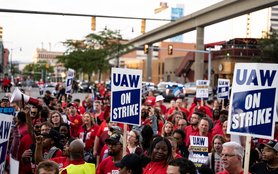While we welcome the holiday marking the end of slavery, we also rededicate ourselves to the struggle to address, name, and end White supremacy. Right now, Congress has an opportunity (and duty) to listen to and center the needs of Black communities, which endured disproportionate loss and damage from the pandemic.
It was a step forward when Congress voted to declare Juneteenth a federal holiday—honoring the announcement in Texas of the end of slavery on June 19, 1865. We welcomed the celebrations of Black history, strength, rebellion, and struggle.
But this commemoration came at a pivotal moment in our history—and is just the beginning of long overdue action. The past few years threw into stark relief the fact that structural racism has deep roots and long branches in our society and economy, and we need to double down on our efforts toward justice and equity, right now and every day.
It can happen. Congress and the administration now have the chance to center the experiences and needs of those who felt the sharpest edge of the pandemic: historically marginalized communities are still struggling with unemployment, illness, a long trail of fatalities, evictions, poverty, food insecurity, and more.
There are several pieces of legislation on the table that could bring about transformational change for Black and Brown families in this country. The failure to pass them—or even to debate them—is a failure to confront what people voted for in 2020, and what our country needs.
Below are six federal building blocks to address racial inequities; while this list is not comprehensive, it’s a place to start.
1. Boost wages so people aren't working in poverty.
The Raise the Wage Act of 2021 would raise the federal minimum to $15 an hour by 2025. It would be the first raise since 2009, when the wage got stuck at $7.25 an hour ($290 a week,$15,080 a year). In that time, the cost of food has risen 25 percent, shelter 28 percent, transportation 38 percent, and medical care 40 percent.
Raising the wage to $15 would benefit at least 27 percent of America’s workers. Most of these workers are adults, working full time, and supporting families.
Furthermore, raising the wage would address some deep and stubborn inequities. Black workers are disproportionately represented in the low-wage workforce. While 27 percent of the total workforce would benefit from the raise, 38 percent of Black workers would benefit (nearly 7 million people and their families).
In ten states, over half of all Black workers would benefit from the increase. Black women are even more disproportionately represented in low-wage jobs. In 30 states, over HALF of all Black and Latina working women would benefit from the raise in the minimum wage. In 11 states, over 60 percent would benefit.
2. Remove barriers for workers to form unions.
The PRO Act (Protecting the Right to Organize) restores the rights of workers to freely form a union and bargain together.
Unions have a long history of reducing inequality, particularly for workers who’ve experienced workplace discrimination and workers in low-wage sectors. Unions improve compensation and working conditions, and protect workers who join together and speak out.
3. Prevent voter suppression.
The For the People Act would counter a wave of state level ballot restrictions that are aimed at suppressing the Black vote. President Biden has labeled these laws “Jim Crow in the 21st Century”; they pose a threat to the bones of our democracy.
4. Mandate paid leave for all workers.
The American Families Plan (AFP) would create a national comprehensive paid family and medical leave program.
The pandemic revealed just how dangerous and unfair it is that millions of workers have no access to paid leave of any kind (sick, parenting, family); and exacerbated the racial inequity in this situation. Black workers are more likely to be in the essential occupations that experience more exposure to the virus, less likely to have access to paid leave, and less likely to have adequate healthcare.
5. Invest in families with children, and the care industry.
The American Families Plan would support families raising children, including child tax credits, universal pre-K, and investments in underpaid child care workers. These provisions would disproportionately benefit families who deal with low wages, lack of access to care systems, as well as the care workers who are overwhelmingly women of color and immigrants.
6. Change the tax system so the wealthy and corporations pay their fair share.
Raise taxes on the rich and corporations, fund the IRS for better enforcement, and fund programs that would create good, green jobs. Over decades, the tax system has tilted wildly to the benefit of the wealthy and corporations, as well as white households.
As always, we beat the drum on a familiar but still fundamental phrase: poverty is a policy choice. And so is White supremacy.
It’s time for Congress—specifically, the Senate—to stop blocking actions that have the potential to improve the lives of millions of people. It’s time to deliver on the promise of Juneteenth.
Demand change. Honor the work of those who came before us.



